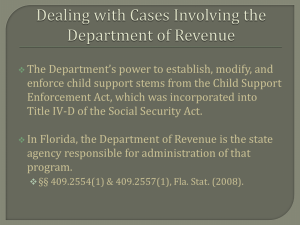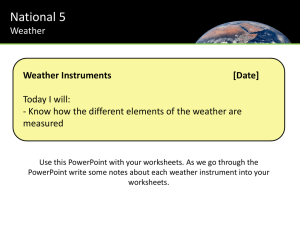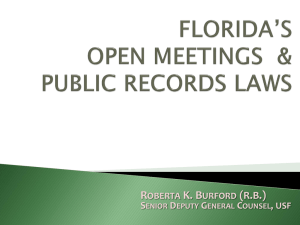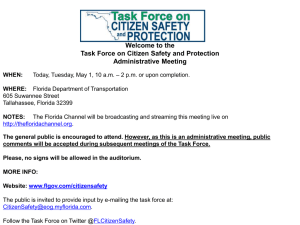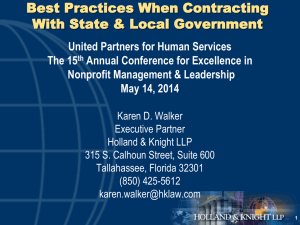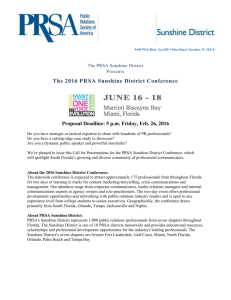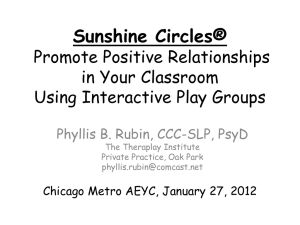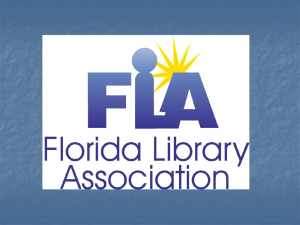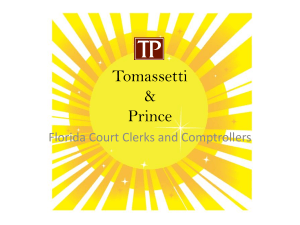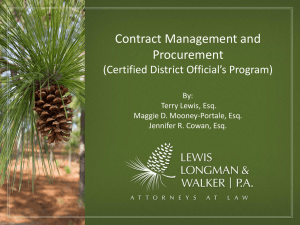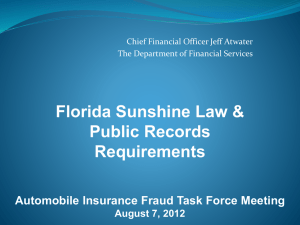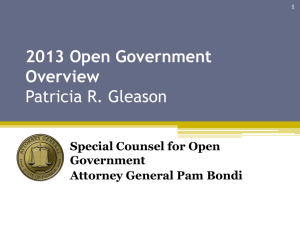Public records and government in the sunshine
advertisement
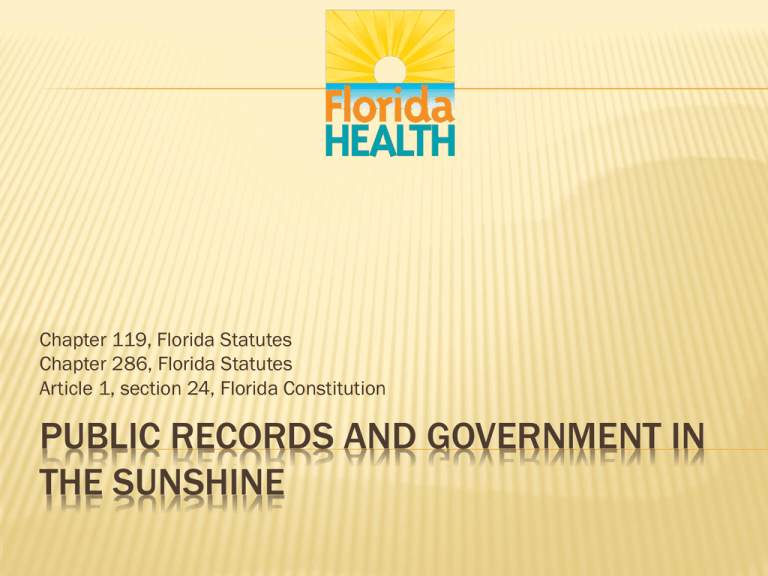
Chapter 119, Florida Statutes Chapter 286, Florida Statutes Article 1, section 24, Florida Constitution PUBLIC RECORDS AND GOVERNMENT IN THE SUNSHINE PUBLIC RECORDS Every person who has custody of a public record shall permit the record to be inspected and copied by any person desiring to do so, at any reasonable time, under reasonable conditions, and under supervision by the custodian of the public records. Section 119.07(1)(a), Florida Statutes. PUBLIC RECORDS Public records act is construed liberally in favor of openness. Exemptions are construed narrowly and limited in their purpose. Agency has burden of showing that the requested documents are exempted from disclosure and must cite the specific statute or law indicating the record is exempt. If the person seeking disclosure of a record prevails in a court case, the agency generally must pay costs and attorney’s fees. ANY PERSON Public records are available to any person who requests them. No purpose or reason needs to be given for requesting the records. Refer public records requests to the Office of Public Records Requests in the Office of the General Counsel at 850-245-4005. WHAT IS A PUBLIC RECORD? Made or received pursuant to law or ordinance. Or in connection with the transaction of official business of the agency. Used to perpetuate, communicate or formalize knowledge. See Shevin v. Byron, Harless et. al., 379 So. 2d 633 (Fla. 1980). WHAT IS A PUBLIC RECORD? Documents, letters, maps, books, tapes, photographs, films, sound recordings, data processing software, other material. Regardless of physical form (includes electronic records, e-mails, text messages). Regardless of location (personal e-mail used to communicate official business is a public record). WHAT IS A PUBLIC RECORD? Inter-office memos or intra-office memos. Memos to the file. Record does not need to be in final form to be a public record. E-mails in connection with official business whether from personal e-mail or DOH e-mail. Text messages in connection with official business whether from personal phone or not. WHAT IS NOT A PUBLIC RECORD? Personal notes and drafts for personal use of the writer are not a public record. See Shevin. If the personal note or draft is communicated to another, it becomes a public record. See Shevin. If a personal note or draft is added to a file or used in any way to perpetuate, communicate or formalize knowledge, it is a public record. See Miami Herald Media v. Sarnoff, 971 So. 2d 971 (3rd DCA 2007). WHAT IS NOT A PUBLIC RECORD? Personal records not related to official agency business, regardless of location, are not public records. Personal e-mails on DOH system are not public records, but could be subject to review to ensure all public records have been disclosed. Because public records laws are interpreted broadly, the possibility exists that an e-mail you believe is private could be a public record. WHAT IS NOT A PUBLIC RECORD A record not in existence. Don’t create a record to summarize or explain other records in response to a public records request. If you create a record in response to a public records request, it becomes a public record. PRACTICE TIPS Consider each DOH e-mail a public record. If an e-mail is regarding an issue under a known exemption, encrypt it (for example, patient information). Don’t mix personal and agency records. Don’t use personal e-mail or text from your personal phone for official state business. PRACTICE TIPS Text messages regarding official agency business are public records. Avoid using text messaging for official business. If memorialized in writing, communicated, and not exempted, it is a public record. DO NOT destroy public records. Public records requests are to be referred to the Office of Public Records Requests, located in the Office of the General Counsel at 850-245-4005. EXAMPLES OF EXEMPTIONS Patient records (§ 456.057(9)(a), Fla. Stat.). Emergency records that identify person seeking care (§ 365.171(12)(a), Fla. Stat.). Infectious disease reports (§ 381.0031(6), Fla. Stat.). Victim identification (§ 119.071(2)(j)1, Fla. Stat.). Bank account and credit card numbers (§ 119.071(5)(b), Fla. Stat.). Social security numbers (§ 119.071(5)(a)5, Fla. Stat.). Attorney Work Product when prepared in anticipation of litigation. These become public records at conclusion of case (§ 119.071(1)(d)1, Fla. Stat.). EXEMPTIONS If a portion of a record is subject to disclosure and a portion is not, the exempted portion must be redacted and the non-exempted portion released. If a record, or portion of a record, is not disclosed the statute explaining the exemption must be cited. If the person seeking disclosure of a record prevails, agency generally must pay costs and attorney’s fees. PENALTIES FOR VIOLATIONS Immediate hearing, agency must comply with a court order to open records within 48 hours. Reasonable costs and attorney’s fees will be assessed against the agency if the agency unlawfully refuses to provide a public record. A public officer who violates public records laws could be subject to a $500.00 fine. Public officer who knowingly violates public records law is subject to suspension or removal. Knowingly violating public records laws is a first degree misdemeanor. GOVERNMENT IN THE SUNSHINE Requirements under the Sunshine Law: all meetings of public boards or commissions must be open to the public at all times; reasonable notice of such meetings must be given; and minutes of the meetings must be taken and open for public inspection. Section 286.011, Florida Statutes Article I, Section 24, Florida Constitution GOVERNMENT IN THE SUNSHINE Sunshine Law applies to “any board or commission of any state agency.” This includes: Ad hoc committees created by a public entity that acts in an advisory capacity to the public entity. Town of Palm Beach v. Gradison, 296 So. 2d 473 (Fla. 2010). Private organizations delegated authority to perform a government function or play an integral part in the decision-making process, which includes recommendations. AGO 07-27. Limited Exception: Committees created merely for the purpose of factfinding (no decision making). AGO 95-06 WHAT TRIGGERS THE SUNSHINE LAW? 2 or more members gathered together. Discussions of issues which will foreseeably come before that board or committee. Telephone calls between members are included. Can’t use non-members as liaisons to avoid law. Applies to all functions of board or commission – formal and informal. WHAT TRIGGERS THE SUNSHINE LAW? Can attend social events, but may not discuss issues which might foreseeably come before commission or board. May not engage in written correspondence regarding board business. Limited Exception: A written report may be circulated, but no comments or discussion may be had until a publicly noticed meeting. AGO 89-23. The writing is a public record subject to disclosure. PROCEDURAL AND TECHNICAL REQUIREMENTS Reasonable Notice Includes time, place, and agenda if available, or a statement of the general subject matter to be considered. 7 days in advance, unless emergency session. Meeting Minutes—brief summary or memorandum reflecting events of the meeting. A verbatim transcript is not required. AGO 82-47. PROCEDURAL AND TECHNICAL REQUIREMENTS Public Participation In 2013, section 286.0114, Florida Statutes, was amended to allow the public a reasonable opportunity to be heard on a proposition before certain boards or commissions. Reasonable rules and policies to ensure orderly conduct are appropriate, such as limiting the time for comment. PROCEDURAL AND TECHNICAL REQUIREMENTS If meeting adjourned and reconvened – must notice the second meeting. Should have large enough room to accommodate attendees. Avoid inaudible discussions. Open to public means everyone – including staff, bidders, and media. Cannot prohibit use of non-disruptive recording devices. GOVERNMENT IN THE SUNSHINE Courts interpret Sunshine Law liberally and exceptions strictly. Actions taken at meetings in violation of the Sunshine Law are void. PENALTIES – SUNSHINE LAW Public officer who violates Florida’s Sunshine Law is guilty of non-criminal infraction with a fine up to $500. Member of board or commission of state agency who knowingly violates by attending a meeting not held in Sunshine is guilty of second degree misdemeanor. Conduct outside state of Florida that constitutes a knowing violation is a second degree misdemeanor. Loss of attorney’s fees and court costs. QUESTIONS Contact Office of the General Counsel, Department of Health at 850-2454005.
